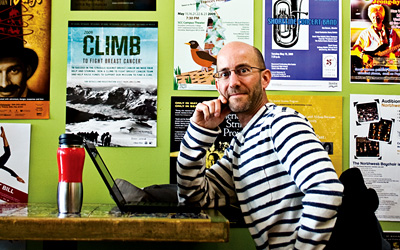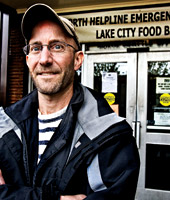Changing the World in a Recession
With or without a job, can we make a difference?

As he considers his next career step, Jeff Keenan says he’s exploring how to apply his skills to create
positive change for people through global development.
Photos by Mike Siegel
By Jeff Keenan ’83
Photos by Mike Siegel
By now, everyone knows the most relevant question of our current economic times: “Are you one of the 91 percent, or the 9 percent?” OK –– maybe that’s not the way the subject is brought up –– but most of you can probably translate that into the actual conversation of the day:
“How is your job situation?”
If you are able to answer with, “I still have a job,” then you count yourself as a member of the still-vast majority of Americans who are employed.
My personal answer to the question is not so fortunate. After 20-plus years of working as a global project and program manager at Adobe Systems, I am one of those who find themselves without jobs during this economic meltdown. And since I have four teenagers at home, I’m definitely in an accelerated job-hunt mode.
Before I go any further, though, let me say a few things about myself by way of introduction and context. I grew up in Hershey, Pennsylvania (yes, Chocolatetown, USA); graduated from Seattle Pacific University in the mid-1980s with a degree in busness/economics; and landed a job at a small Northwest software startup: Aldus Corp. That’s the “other” successful Northwest startup, which most people know as “the Page-Maker company.”
I enjoyed a wonderful ride through both the desktop publishing and the Internet revolutions — first with Aldus, and subsequently with Adobe, which acquired Aldus in the mid-1990s. And I have been privileged to participate in many incredible innovations that I believe have helped change the world for the better.
But that’s only half of my story.

Jeff Keenan regularly donates food to his local food bank, a practice he says come from his philosophy that we need to take care of those in our own backyard first. |
I have also had a passion for making a difference in other ways. I’ve volunteered for everything from food banks to animal welfare shelters. I’ve built houses in Mexico and refurbished a homeless residence in Shoreline, Washington. I’ve coached youth sports teams, taught Sunday school, and served as a board member for several local organizations.
Most recently, my desire to help people who live in conditions of extreme poverty worldwide led me
to co-author the book, Our Day to End Poverty: 24 Ways You Can
Make a Difference (Berrett-Koehler Publishers, 2007). It’s a resource for
all of us “non-activists” who want to become more involved in tackling
the issues of poverty both in our
local neighborhood and in our
global neighborhood.
So, as I sit here, unemployed, I am left with this question: “Why is it important to keep striving to make a difference for others when I find myself in a stressful, fearful, challenging time in my own life?”
Actually, it’s a question that is
apropos for all of us right now. And I can think of two answers. The first came up in a conversation with Response editor Jennifer Gilnett. She made the observation that “helping others is a way to put our own difficulties in perspective.” Absolutely!
The second answer is just as simple: God calls us to help each other (especially the poorest among us) when we’re in need. And that call doesn’t stop, or take a break, just because I happen to be without a job.
Of course, those of us in the 9 percent are probably spending most of our “working hours” seeking household-sustaining income opportunities. My kids still want to be fed, kept warm and dry, and, someday soon, go to college. And those in the
91 percent are very likely working more hours than ever,
becoming extremely stretched and stressed in the current
economic climate.
But I am particularly energized at this moment by knowing that the call to do God’s work didn’t stop when my individual life circumstances changed. Yes, we definitely need to take care of ourselves. And yes, there is an important life balance that we must find for ourselves and our families in terms of how much we can give at any particular point in our lives. But there is so much that each of us can do on a daily basis when we seek to integrate making a difference for others with who we are and how we live. And through our giving, there is much that we receive.
The needs are definitely there. The core issues of poverty access to food, housing, education, health care, a sustainable environment, and human dignity are the same in our country
as they are around the world. It’s only the degree that’s different. And in this technologically wired, interconnected 21st century, our “community” and our “neighbors” are really anywhere, and everywhere, in the world. So, whether we choose to give locally or globally, we are changing the world.
In this particular “season” of my life, in the midst of my
unemployment and job search, I want, more than ever, to make
a difference in whatever ways I can. I’m writing this article in hopes that I will encourage others; I am visiting schools, bookstores, and churches to speak about my book and give practical tips on ending poverty, and I am volunteering for our church’s youth group fundraising auction. In May, I co-chaired the inaugural Pacific Northwest 2009 Microfinance Conference held at SPU titled “Can YOU change global poverty?” I am also participating on the steering committee for Global Washington’s 2009 Global Development Conference, which occurs in December.
For people like me who are unemployed and struggling right now, I have a story to tell. Aldus and PageMaker were an integral part of the desktop publishing revolution, which has forever changed how the world communicates. Aldus, however, was
only started after the founder (Paul Brainerd) and four software engineers lost their jobs. That’s right — they were unemployed. In the midst of their potentially discouraging situations, they discovered and pursued the huge potential of something called
a “personal computer” and the “laser printer.” From there,
PageMaker and desktop publishing were born.
Of course, our own next thing may not be on that scale. But the future is always unknown, which is where our faith in God’s plan for our lives comes in.
Whether you find yourself in the 9 percent or the 91 percent, I hope that you use this moment in time as an opportunity to reflect on what’s important in your life. I hope that you discover new insights and perspectives about your own life journey. And I hope that those insights will encourage you to find new and better ways to make a difference in your family, with your friends, and for those in need around the world today, tomorrow,
and 10 years from now.
Read more Good News in the Bad News
Return to top
Back to Features Home
|